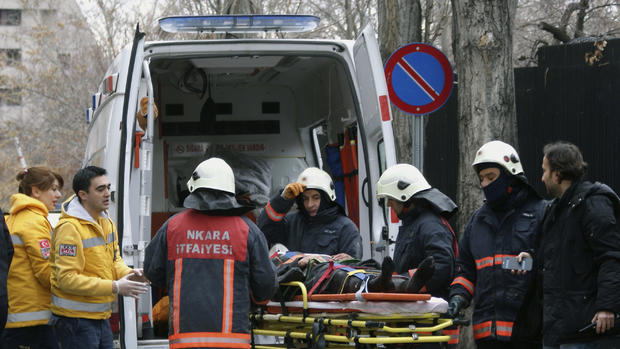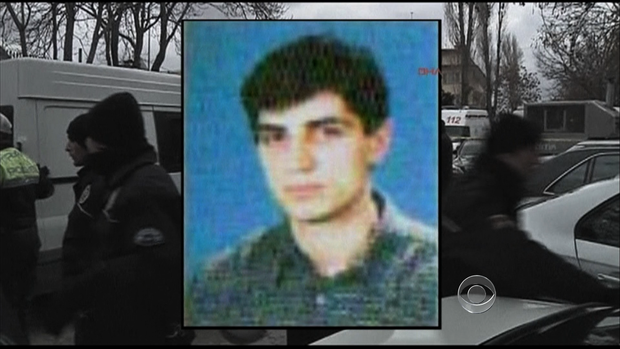U.S. Embassy in Ankara, Turkey hit by suicide blast; 1 dead, U.S. officials say
Updated at 3:18 p.m. ET
ANKARA, Turkey A suicide bomber detonated an explosive device at an entrance to the U.S. Embassy in the Turkish capital on Friday, killing himself and one other person, officials said.
U.S. Ambassador Francis Ricciardione told reporters that a guard at the gate was killed in the 1:15 p.m. blast, and a Turkish citizen was wounded. Reuters quoted Ricciardione as saying the slain guard was a Turkish national. U.S. Embassies are usually guarded by a combination of local security personnel and American diplomatic security forces.
The bomb appeared to have exploded inside the security checkpoint at the side entrance of the embassy, but did not do damage inside the embassy itself. Footage showed that the door had been blown off its hinges and debris littered the ground and across the road. An Associated Press journalist saw a body in the street in front of an embassy side entrance.
Turkish Prime Minister Recep Tayyip Erdogan said on Turkey's HaberTurk television that Friday's suicide attack is the work of the Revolutionary People's Liberation Party-Front, or DHKP-C. The group has been designated a terrorist organization by the United States and the European Union.
"It is my principle to speak only after receiving the final result, but I can say clearly that it is DHKP-C," Erdogan said.
CBS News senior correspondent John Miller, a former deputy director in the National Intelligence Director's office, reports the group attacked a police facility using a suicide bomber in September and has threatened to hit Western targets before.
The group's members have used assassination, suicide bombing, kidnapping, and are sophisticated in pre-operational surveillance, Miller reports. They oppose NATO and Turkey as a puppet of U.S. imperialism.
White House spokesman Jay Carney called the attack "an act of terror" — one that comes as the U.S. State Department is transitioning to new leadership amid ongoing concerns about diplomatic security around the world. Outgoing Secretary of State Hillary Clinton's final day on the job is Friday, after which Sen. John Kerry will take the reins as America's top diplomat.
"We live in very complex and even dangerous times as we saw again just today," Clinton said Friday while addressing State Department workers at a farewell event.
Clinton's final months in office were dominated by the Sept. 11 attack on the U.S. Consulate in Benghazi, Libya, which left four Americans dead, including Ambassador Christopher Stevens. The Obama administration's initial characterization of the consulate attack as being linked to a protest drew heavy fire from Republican critics and still generated fireworks when Clinton testified on the assault before lawmakers last week.
Former U.S. Ambassador to Turkey James Jeffrey said on a conference call with reporters, including CBS News, that Turkish authorities have identified the bomber as Ecevit Shanli, a member of DHKP-C.
A source familiar with security at the embassy in Turkey told CBS News correspondent Margaret Brennan that, in their view, the security measures taken at the compound seemed to have worked, in that the attacker was unable to gain access to the main embassy building.
The source said the U.S. Embassy in Ankara is considered a high-security post, and there are Turkish police present at all times. All gates leading into the compound are manned by armed Turkish security guards, according to the source.
Police swarmed the area and several ambulances were dispatched. An AP journalist saw one woman who appeared to be seriously injured being carried into an ambulance.
The embassy building is heavily protected. It is near an area where several other embassies are located, including that of Germany and France. Police sealed off the area and journalists were being kept away.
Homegrown Islamic militants tied to al Qaeda have carried out suicide bombings in Istanbul, killing 58, in 2003. The targets were the British consulate, a British bank and two synagogues.
In 2008, an attack blamed on al Qaeda-affiliated militants outside the U.S. Consulate in Istanbul left three assailants and three policemen dead.
In the November 2003 attack on the British consulate, a suspected Islamic militant rammed an explosive-laden pickup truck into the main gate, killing British Consul-General, Roger Short, and his assistant, Lisa Hallworth.
Miller noted on "CBS This Morning" the possibility of a connection to the recent Israeli airstrike in Syria, for which Damascus and its staunch ally Iran vowed to retaliate.
Iran, Miller said, has extensive intelligence operations in Turkey, and its Islamic militant group ally, Hezbollah, also has significant assets there.
"Iran, in terms of retribution, would stack Israel and the U.S. together," says Miller.
Turkey has become a harsh critic of the regime in Syria, where a vicious civil war has left at least 60,000 people dead. The first of six Patriot missile batteries being deployed to Turkey to protect against attack from Syria was declared operational and placed under NATO command on Saturday and others were expected to be operational in the coming days.

